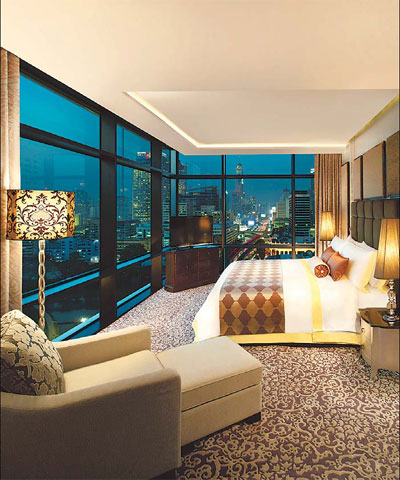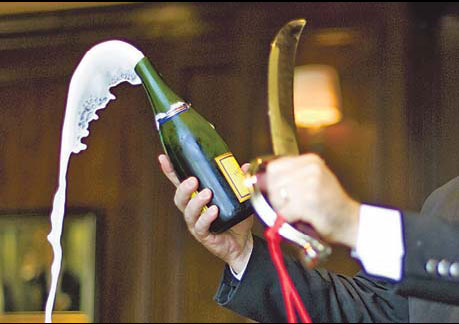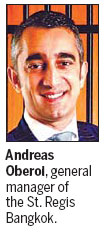St. Regis Bangkok opens to fanfare
 |
|
The 227-guestroom St. Regis Bangkok provides a luxury environment and its legendary butler service. Provided to China Daily |
 |
|
Champagne sabering is an iconic ritual at St. Regis hotels. Provided to China Daily |
Hotel profile | Bangkok
The hotel in Thailand follows in the footsteps of other St. Regis hotels, beginning with the legendary New York establishment founded in 1904 by John Jacob Astor IV. Liu Weifeng reports.
Following in the footsteps of the first St. Regis in Asia, in Beijing, the group has set up another hotel featuring its signature services, in Bangkok, Thailand.
Thailand is a popular business and leisure destination for travelers from China and the new hotel will be a sparkling addition to the group's other hotels in Europe, the United States, Japan and the Middle East, says Andreas Oberoi, general manager of the St. Regis Bangkok.
The top luxury brand under the Starwood hotel management group, St. Regis also has hotels in Shanghai and Lhasa, while hotels in Sanya Yalong Bay, Hainan province and Tianjin will open by the end of this year.
"Luxury" here means superior facilities, service with a smile, history and culture.
The 227-guestroom St. Regis Bangkok continues the St. Regis heritage that started in New York in 1904. Built on the Astor family legacy, John Jacob Astor IV, created a new style of grandeur and elegance for elites.
This concept of luxury was based not merely on architecture and ornamentation, but aimed to develop the level of comfort desired by the wealthy, looking for lavish entertainment, parties, balls and fine dining. The personal service that Astor demanded set an industry standard, by providing butler services.
At that time, such standards were confined to the homes of the rich, where gatherings were by invitation only.
At St. Regis Bangkok, the brand's legendary butler service is extended to all guests - which is a first of its kind for a five-star hotel in Bangkok.

"In Thailand, there is a high cultural value placed on providing excellent service, and we are delighted to offer each of our guests their own personal butler," Oberoi says.
The hotel's butlers are trained in the English tradition of service and are ready to cater to individual requests, no matter how great or small, at any hour of the day.
At St. Regis hotels, a winding staircase is a must-have facility, showcasing the establishment's extraordinary elegance. This is true in Beijing, where a section of the curved staircase is seen in the lobby and creates a stunning first impression for guests.
In Bangkok the staircase begins on the 12th floor, where the reception desk is located, thereby providing more space on the ground floor.
"It's fancy, especially for guests holding wedding ceremonies here," says Holger Jakobs, director of sales and marketing at St. Regis Bangkok, who worked for many years at Beijing's St. Regis. "It gives the bride's big day a fairytale element when stepping down the stairs and posing for pictures."
Champagne sabering, an iconic ritual at St. Regis, is held at the Bangkok hotel every night at 6:30 pm. The tradition of cutting off the collar from the neck of a champagne bottle with a saber was popular in the Napoleonic era as a form of celebration. It's carried out today at St. Regis, as it was previously under the discerning eye of John Jacob Astor, the founder of the first St. Regis hotel in New York.
Bloody Mary, a popular cocktail today also has its roots in the St. Regis, since 1934, when Fernand Petiot, bartender at the King Cole Bar in the St. Regis New York, introduced the Red Snapper, made with vodka and tomato juice - which was later renamed the Bloody Mary.
The cocktail has a variant in Bangkok called Siam Mary, with the addition of Thai basil, lemongrass, Worcester Sauce, tabasco, and black, red and cayenne pepper to give it more punch.
"The Siam Mary is infused by the original Bloody Mary recipe with native flavors, transforming the drink into a reflection of local cultural tastes," Oberoi says.




















